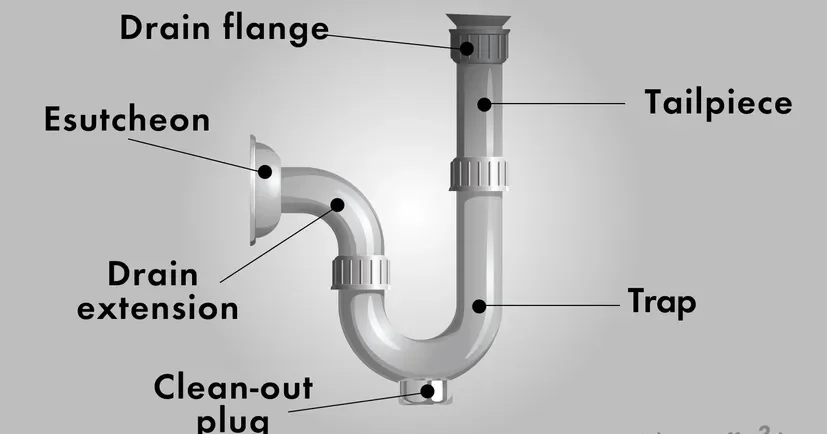Key Takeaways:
- Comprehend the critical components and how they function within residential plumbing systems.
- Identify common plumbing issues and adopt preventative measures to avoid costly repairs.
- Learn how regular plumbing maintenance can benefit your home and the environment.
- Recognize the advantages of embracing modern plumbing technologies for a more efficient home.
- Understand the importance of choosing the right professional plumbing services for your home’s needs.
Essential Components of a Plumbing System
The intricacies of a residential plumbing system may seem daunting at first, but a basic understanding of its components can help homeowners manage and maintain their system more adeptly. The system’s lifeblood is its pipework, consisting of a network that supplies water and another that drains it away. The supply side is pressurized to deliver water to appliances and fixtures, while the drainage side relies on gravity to remove waste materials.
Other integral components include shut-off valves, which give homeowners control over the water flow in emergencies or during maintenance, and traps — U, S, or J-shaped pipes under sinks and fixtures that prevent sewer gases from entering the home. Awareness of these components and their function is essential when addressing issues or discussing concerns with professionals providing Seguin plumbing services, ensuring your system receives the care it needs.
Common Plumbing Issues and How to Prevent Them
The everyday use of plumbing fixtures can lead to several common problems, including leaks, clogs, and drips that can wreak havoc over time. A faucet that drips at a rate of one drip per second can waste more than 3,000 gallons per year — enough water to take more than 180 showers. Such waste can be mitigated by replacing internal components like o-rings or washers. Another prevalent issue, clogged drains, can be prevented by being mindful of what goes down your sinks and not treating your toilet as a waste bin.
Preventive measures such as regular cleaning using natural cleaners like baking soda and vinegar can help maintain pipes and mitigate the buildup that leads to clogs. Furthermore, installing drain strainers can capture hair and other items that can block pipes. Educating the household on what should and should not go down the drains goes a long way in preventing common plumbing mishaps.
The Importance of Regular Plumbing Maintenance
Plumbing maintenance should not be an afterthought; it’s a preventive measure to save on future costs. Leaks and breaks in your plumbing system can lead to significant water loss and property damage. Regular maintenance can catch these problems before they become disasters. Checking for signs of moisture or small puddles around appliances and fixtures can identify leaks early on. Regular checks for water pressure can also reveal issues with your pipes or potential blockages.
Seasonal maintenance tasks, like ensuring your piping is insulated against freezing temperatures or checking the condition of your sump pump before the rainy season, are critical practices that can prevent emergencies. Investing in maintenance now can save a significant amount in future repair costs and even reduce your regular water bills.
Professional Plumbing Assessments
While regular homeowner maintenance can prevent many common issues, there is no substitute for the expertise of a professional plumber. Trained technicians use specialized equipment to inspect a home’s plumbing system in-depth. They can detect leaks hidden behind walls and under foundations, identify pipes prone to freezing, assess the water heater’s condition, and much more.
Such evaluations are especially significant for older homes or after a major renovation that could have impacted the plumbing system. Professional plumbers can advise homeowners on upgrades that enhance the system’s efficiency or pinpoint areas where preventive measures could be most beneficial. Engaging such services regularly ensures the long-term health and efficiency of your home’s plumbing infrastructure.
Benefits of Upgrading to Modern Plumbing Technologies
Advancements in plumbing are constantly offering new and innovative ways to improve home water systems. From tankless water heaters that provide hot water on demand while reducing energy costs to dual flush toilets that use less water per flush, these modern solutions cater to a more eco-friendly and cost-effective lifestyle. The latest advances in plumbing technology are not only about convenience but also about resource conservation and reducing homeowners’ ecological footprint.
Intelligent water systems equipped with sensors can detect changes in water pressure and flow rates, indicating leaks almost instantly, granting homeowners the ability to address issues promptly. By upgrading to these innovative solutions, homeowners can ensure their plumbing systems remain as efficient and effective as modern technology allows.
Choosing the Right Plumbing Services
Selecting a trusted plumbing service is a decision that requires careful consideration. Key factors should include:
- The company’s reputation.
- Provided references.
- The scope of services offered.
- The transparency of their pricing structure.
Ideally, a plumbing service should be responsive, with professional plumbers ready to solve any issues promptly and effectively. In search of such service providers, researching the experiences of past customers can provide invaluable insight into the quality of service one can expect.
Choosing a local plumbing service has advantages, particularly one familiar with the region’s unique plumbing challenges and building codes. Exceptional plumbing services offer reactive support in times of need and encourage proactive maintenance to avoid future issues.
Environmental Considerations in Plumbing
Environmental sustainability has become an increasingly relevant topic in all areas of home maintenance, including plumbing. Through diligent practices, homeowners can significantly impact water conservation efforts. Fixing leaks, choosing high-efficiency fixtures, and using water responsibly are all steps toward a more sustainable home. Individuals contribute to a greater environmental cause by facilitating a sustainable lifestyle and conserving water for future generations.
Organizations are at the forefront of educating consumers about water-efficient products and behaviors that can help protect this vital resource. Adopting such products and practices, you not only save money on your utility bills but also become a part of the larger movement toward sustainability and environmental stewardship.


